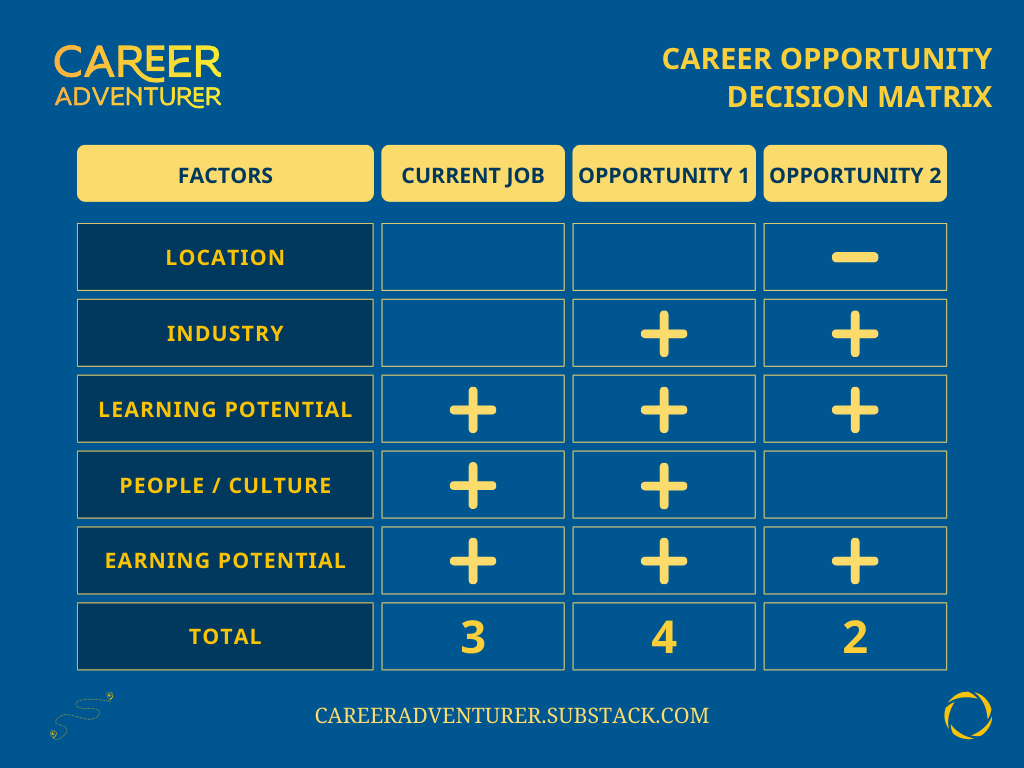The Jump - #3 - April 2024
Money matters, but don't overdo it! Evaluate career adventures with a decision matrix.
Welcome to the 3rd installment of The Jump. It offers monthly musings that will help inspire and encourage you to consider new things. Plus, they’ll provide helpful tips and factors to consider in your career adventures. We all need help on life’s vocational journey.
We often miss the inspiration that is presented to us daily. It could be listening to music, reading the news, or taking a walk. These quick thoughts can offer powerful contemplative points in time. They can help you on your own career adventures.
In this edition, I’m talking the importance of money in career adventures. We’ve got…
Mo Money, Mo….A Great Quote from Michael Scott & Notorius B.I.G.
Use a Career Decision Matrix
A good book and good watch!
“Mo’ money, mo’ problems”
Michael Scott (The Office) and Notorius B.I.G.
Credit Michael Scott from The Office or The Notorius B.I.G. from his hit song with Mase and P-Ditty 20+ years ago. As said in Notorius B.I.G.’s song, “The more money we come across the more problems we see.” Boy is this true. Sometimes we think pursuing money will make us happier.
“Money is a good thing or I’ve got bills to pay!” you might say. Yes, we need money, especially if you don’t have it. Don’t confuse having more money or making more money with complete happiness. Accumulating wealth as the primary objective above all else has real trade-offs. The tradeoffs could include spending less time with your family and friends or having robust career adventures. These are true sources of happiness.
Why am I talking about money today? Jon Rahm is why. Heard of him? Rahm is one of the top golfers in the world. He is sure to be part of the sports pop culture discussion this month because he’s defending his Master’s title.
Rahm recently left the PGA Tour to join LIV Golf, the PGA Tour’s Saudi super-funded rival. He is GETTING PAID! Yet, Rahm said he left the PGA Tour because he loves his family, the LIV golf concept, and the opportunity to grow the game of golf more broadly. For many of us, money seems like the real reason.
Many pundits have said, “Can’t blame him! He is getting generational wealth. He is providing for his family!” This misses the point. Rahm was already making ~$15 million / year on the PGA tour. His lifetime earnings are estimated to be >$50 million. Yes, $400 million is far more than $50 million. But, assuming Rahm has any personal finance skills or just a decent accountant, he already has generational wealth. More money is not necessarily better in his case. Just read chapter 1 of Malcolm Gladwell’s book David & Goliath for the tradeoffs of wealth with parenting, as an example.
Rahm recognizes the significant tradeoffs he’s made for the moola. His public statements lead one to believe he may lament the decision to leave the PGA Tour. Rahm no longer will be able to defend his titles on some of his favorite courses.
“It was a lot harder to be at home not competing and know that those events were going on. Palm Springs and Torrey, those weeks were hard. I’ve explained so many times how important Torrey is for me. And driving by Phoenix as often as I had to and knowing that I wasn’t going to play there, it’s definitely emotional. That’s one of the things that I’m going to miss.”
“I’m hoping that in the near future I can be back playing some of those events.”
Only Jon Rahm knows if his move to LIV golf is worth the money. Maybe it is. That said, it sounds like he has some major misgivings. He can’t defend his titles at famed PGA Tour venues. He isn’t playing against the top players in the world each week.
I wonder if Rahm made the decision to jump without doing the proper due diligence before leaping. He knew he wouldn’t be able to defend his PGA Tour titles on famed courses before he left. He knew he wouldn’t play against the top players in the world each week. Seems like he may have used a one factor decision process (i.e. - money) or just listened to his agents too closely.
When you plan to make a career jump, don’t over-value money. If you make less than $75 - $100k/yr., money justifiably could be the number 1 priority. But, if you make more than that, beware. Make sure you consider money along with family, friends, location, challenge, skills developed etc. Your happiness is at stake. Read on for an example on how you might evaluate a decision.
Avoid “Leaper’s Remorse” with a Decision Matrix
I used a decision matrix to help decide whether I should leave Procter & Gamble for an adventure in the wine biz. It really helped my crystalize the decision. Plus, it enabled a conversation with myself and my girlfriend.
Anytime you are considering a new career adventure there are a number of factors to consider. Defaulting to money is common. But, there is much more. Location, learning potential, the people, and the industry should also be considered.
Richard N. Bolles wrote a book called What Color is Your Parachute, to help you with this challenge. It’s a good read. He offers up 8-factors to consider for career happiness. It’s good. Yet, I think it overcomplicates the decision.
5 Factors
Here’s how I like to approach it. I use five key factors to filter career adventure decisions:
Location, Location, Location - It’s not just for real estate. Really ask yourself, is the location ideal or acceptable? More jobs are remote these days, but this is still important. You might need to travel.
Industry Space - Is it in an industry you are passionate about? If you don’t love the space, don’t do it. You may find the effort to stay informed to be monotonous and boring. It will be harder to keep up with those who are more passionate.
Learning Potential - I rank learning before earning. Pay bumps are nice. The increased happiness doesn’t last, though. Life long learning and exploration does fuel sustained happiness. Ask yourself if you’ll have the opportunity to learn and for how long.
People - Have a friend or confidant you respect at the place? That’s a positive sign. But, check-in to see if they are happy. Don’t stop there. Read Glassdoor reviews. If the CEO isn’t well rated and the company is below 3.5 stars, really understand why. Or, find someone else who has worked at the place. I did this once and turned down a job because I worried about fit.
Earning Potential - Money is important. It’s not first on the list in my mind. No amount of money will outweigh poor marks in the above factors. Yeah, you’ll have a Benz, but you’ll be miserable.
Putting to Action
So, you’re considering the new adventure. Here’s how to put it to action.
You want the new opportunity to be at least as good as the current opportunity, right?
Step 1 - Lay out the Matrix
Include all jobs / paths you are considering at the top. This includes the current job or career you are in. Always perform this exercise with the incumbent so you do not have “leapers remorse” later. Remember, this could be done with a specific job or desired job type.
Step 2 - Assign Pluses and Minuses
Next, assign pluses, zeros, and minuses for each space. A plus for something clearly positive, a zero for something you believe is neither good nor bad, and a minus for something clearly bad. Here is an example of I how I applied it recently.
I was evaluating a “dream job” in the above example. As you can see, I had a good adventure going. That said, I was curious about a new space. The two jobs I was evaluating were in the same industry. It was a really tough decision.
Step 3 - Assess
Last, take a step back and assess the options. Do your best not to change the scoring. If the answer is different than you expected, think about why you assigned the plus or minus to each one. Beware of “dream jobs.” The reason: maybe the culture or location suck. If you assign a minus to the people / culture box, be really careful. You might be doing the work you love, but you’ll hate it if it’s in a terrible environment.
This is a start. Maybe there are other factors you think should be considered. Add them. Just don’t go overboard. Evaluating any adventure is both art and science. The point: have a decision matrix to crystalize your decisions. Use one like this, or make up your own.
Read David & Goliath; Watch Succession
“Read the Bible?” you ask. Sure, if you want. Read David & Goliath: Underdogs, Misfits, and The Art of Battling Giants by Malcolm Gladwell. On the surface, this book is not about careers. At least not all of it.
The first section is tangentially. It’s all about the advantages and disadvantages of wealth. It discusses how wealth impacts children and family. The message: you can have too much. I’m not a socialist. But, the book points out that wealth accumulation has diminishing returns and at some point, decreasing returns.
This is exactly the point of the HBO Dramody, Succession. It’s a hilarious story about entitled children trying to position themselves to inherit their father’s media empire. The kids have been poisoned by too much money.
Don’t Let Money Poison the Well
Wrapping up. Money matters. You gotta live. You need food, shelter, vacations, and more. But, too much can be poisonous. If you let money be the only guide, you may contract “leaper’s remorse.” Use a decision matrix to help you evaluate new career adventures. It will help you make better decisions that include the need for wealth accumulation, but not over value it.
Other notes
The Career Adventurer Podcast is live! You can find it on Substack or on major podcast channels (e.g. - Apple, Spotify, etc.).
Thanks for reading The Jump! Like and Restack with you own thoughts to spread the word!
Paul G. Fisher
The Career Adventurer







